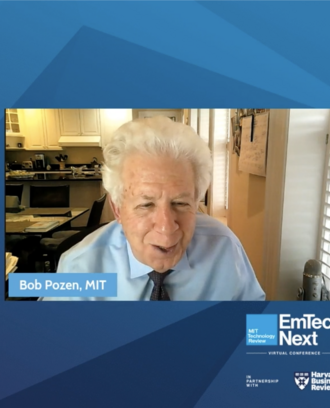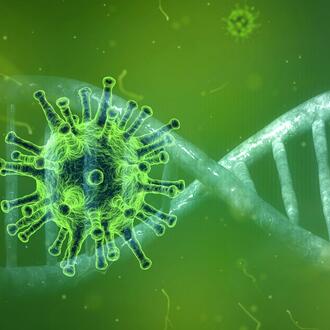How sharing what we don’t know can build trust in medical research, for the COVID-19 vaccines and well beyond
In this era of proliferating misinformation (which is false and misleading) and disinformation (misinformation which is intended to deceive), varying levels of mistrust of the COVID-19 vaccines are not that surprising. Uncertainty – especially about something as vital and ubiquitous as health – tends to intensify our need for definite answers. And that demand creates a breeding ground for misinformation and disinformation. As a result, we turn to various information sources, which include both social and news media. However, even the trusted, familiar sources may lack the most current, authoritative answers.
Charles Senteio is an MIT MLK Visiting Scholar for the 2020-2021 academic year. His community-based research endeavors to address persistent healthcare disparities. His funded investigations of several chronic conditions include: HIV/STIs, diabetes, hypertension, chronic kidney disease, and breast and prostate cancer.
For example, I used to get my medical research updates from PubMed, a database of peer-reviewed articles on life sciences and biomedical topics. During the pandemic, I realized I was getting health research updates seemingly daily on the nightly news and networks like CNN. Scientific discovery in the age of COVID-19 is “Breaking News!”
Reporting results of medical research before the peer-review process is complete increases uncertainty. Last summer, the scientific community faced pressure to relax the rigorous research standards that are in place to actually reduce uncertainty. This pressure was understandable given the desire for vital information concerning health risks and what we can do to reduce risk. Reasonable people continue to ask questions that do not yet have answers – or at least answers informed from the results of the peer-review process. So, reasonable people seek sources that may help increase certainty.
For example, some information sources tell us we may be able to stop following the social distancing guidelines we have heard consistently for several months. Even entire states with seemingly similar risks have disagreed on what guidelines may be safe. And variations persist for what constitutes safe social distancing in schools. Is it six feet or three feet? We want more definitive answers. Reasonable people ask why there is so much conflicting information, which seems to change frequently, if scientists are supposed to know the truth.
The public is now seeing, perhaps for the first time, that the scientific discovery process is quite messy. We scientists argue quite a bit about what the “truth” is and how we arrive at it. Skepticism and doubt are fundamental to the peer-review process. Scientists participate and agree to these norms. We continuously critique our peers’ proposed discoveries as we continuously revisit and often revise scientific “truth.”
Most people outside of the scientific community may not appreciate the degree to which our methods and findings are continuously interrogated. We scientists are privy to these arguments, but the pre-pandemic public heard about a health risk or treatment protocol only after we had reached some level of consensus.
COVID-19 has taught us that the public has a thirst for scientific discovery, and this is a great opportunity for us scientists to not only disseminate our work to wider audiences, but also to share how we go about doing our work. Along the way, we should more clearly disclose our own uncertainties. Since scientific knowledge is continuously expanding, the more we learn the less we may be certain.
The CDC released guidelines for safe socialization for people who are fully vaccinated and those who are not. As the proportion of the population that is fully vaccinated increases, and our knowledge and understanding increases, those guidelines will be amended. And that is OK. Scientific discovery is fundamentally a process that builds upon previous discovery. So sharing our own level of uncertainty may help enhance the level of trust the public has in us, even if it is unsettling to them.
The good news is that we have research that helps us recognize the human factors in communicating what we know and what we do not know in this time of rapid scientific discovery and heightened uncertainty. We should draw upon insights from health informatics and other social, behavioral, and communication sciences on how to advance public understanding of COVID-19 vaccines, and of other health information.
For example, the MIT Sloan Health Systems Initiative highlights new research related to messaging campaigns. And the Rutgers School of Environmental and Biological Sciences (SEBS) has synthesized what the science says about how to create effective campaigns. As that site says, “We need to understand the reasoning behind people’s decisions to act a certain way, and we need to start with their beliefs, not ours.”
That means that the scientific community and the public must enter into an agreement to close the chasm between them. Both groups should share our mutual knowledge and concerns so we may have a more honest dialog about what we know, and what we do not know – at least what we do not know yet.
Health scientists and clinicians should consider disclosing their level of uncertainty when sharing findings or attempting to answer questions. In my community-based health informatics equity research, I find it valuable to offer what I do not know (yet) prior to offering what I do know. I try to do this at the nascent stages of building the reciprocal relationships required to do this work. I find that acknowledging and disclosing uncertainty can enhance credibility within the communities I partner with. And trustworthiness is now at a premium given how individuals from medically underserved communities tend to report higher levels of mistrust and how COVID-19 infection, hospitalization, and mortality is disproportionally impacting medically underserved communities.
In turn, the public needs to provide space for scientists, including physicians, to disclose their levels of certainty. They need to recalibrate unrealistic expectations that health researchers and physicians should have all the definitive answers.
The rollout of COVID-19 vaccines is a specific opportunity to share what we still need to learn. The scientific community appears to agree on vaccine safety and efficacy, especially when compared to risk of not being vaccinated, but reasonable people may ask about long-term risks given that they were developed so quickly. And if the clinical trial participants were not representative of the population, then how do we know what the risks are for different groups whose representation in the clinical trials does not reflect their representation in the population? And what of the variation in efficacy across the types of vaccines?
Since we agree that vaccines do not make us safe, vaccinations do, there is heightened urgency and consequentially scrutiny for how the vaccines are being distributed. We observe fairly dramatic racial disparities in vaccination levels across different areas of the country. Serious questions remain as to why, and the scientific community needs to address what we know and what remains uncertain. A recent poll suggests that levels of medical mistrust, which people of color historically report higher levels of, may not be driving these racial disparities in vaccination. The public needs to allow us the space to continue working to find answers.
We in the scientific community can also do more. For example, I am currently working with colleagues to measure our credibility, as researchers and healthcare providers. We aim to investigate to what effect credibility may have on our ability to influence health behaviors from selecting to be vaccinated, to participating in medical research, to getting cancer screens.
The pandemic has revealed to a wide audience the uncertainty that is part of scientific discovery. While it may be uncomfortable to publicly disclose that our scientific findings are continually scrutinized and frequently amended as scientific discovery continues to advance, increasing transparency may result in enhancing trust and ultimately better health outcomes. So, doing so has value well beyond increasing COVID-19 vaccine uptake.
Charles Senteio is an MIT Sloan School of Management MLK Visiting Scholar for the 2020-2021 academic year. He is a health informatics researcher focused on improving chronic disease outcomes for underserved populations.



